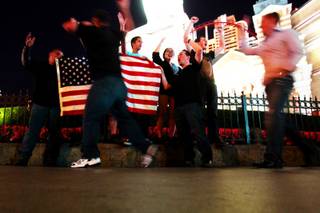Published Monday, May 2, 2011 | 1:05 p.m.
Updated Monday, May 2, 2011 | 5:18 p.m.
Speech Text
Obama's announcement
A prominent rabbi who studies the use of the Internet to recruit terrorists said Monday he doesn’t expect the killing of al-Qaida leader Osama bin Laden in Pakistan to slow the proliferation of websites catering to like-minded groups and lone wolves.
Rabbi Abraham Cooper, associate dean of the Simon Wiesenthal Center and its Museum of Tolerance in Los Angeles, said in Henderson that bin Laden supporters have used social networking, blogs and other digital outlets to express condolences for the man who ordered the 9/11 attacks.
Cooper said he expects conspiracy theorists who doubt bin Laden’s death because his body was buried at sea to flood the Internet and espouse theories at least through the 10th anniversary of the attacks in September.
What Cooper fears most are groups or individuals who will use the Internet to vow revenge.
“A lot of that will be bombast,” he said. “Some of that will not, and it’s going to be a tough job for homeland security and law enforcement to try to go through all of that and figure out what’s real and what’s not real.”
Individuals he described as lone wolves because “they’re off the grid and not easily known to authorities” but who are committed to terrorist causes are particularly worrisome to him.
“And that is the toughest challenge of all, finding the virtual pin in the haystack,” Cooper said.
A new generation of al-Qaida adherents can be counted on to use websites to promote bin Laden as their “No. 1 martyr.”
“In the propaganda area they’ll have a field day,” Cooper said. “Having said that, it’s a very good thing that Osama bin Laden is no longer alive.”
Earlier this year, the rabbi identified 14,000 Internet sites that promote terrorism or hatred against religions, racial and ethnic groups, an increase from 11,500 last year. The websites include postings on Facebook and YouTube, as well as blogs and other social networking sites.
Cooper was in town for Sunday’s Holocaust Memorial Day at Congregation Ner Tamid, and then met Monday with law enforcement agencies before holding a news conference on his annual study of the Internet. The Simon Wiesenthal Center was named for a Holocaust survivor who brought 1,100 Nazi war criminals to justice.
After the news conference at the Greenspun Media Group headquarters, Cooper said with bin Laden out of the picture, attention will certainly turn to American-born jihadist Anwar al-Awlaki, a savvy Internet user and al-Qaida recruiter based in Yemen. Cooper said al-Qaida leaders such as al-Awlaki have effectively used the lone-wolf concept developed by American extremists as a recruiting tool.
“He’s been manipulating the lone wolves around the world, including the Fort Hood shooter (Nidal Malik Hasan) who got his validation through a series of emails,” Cooper said.
“It seems that as long as al-Awlaki is still around, and he’s really promoting the individuals or small cells acting independently, I think we’re going to see more of that online. If he were to be taken out, perhaps that would decentralize things even more.”
Digital technologies have helped fuel terrorist attacks, such as the 2008 killings in Mumbai, India, that resulted in the deaths of more than 170 people, Cooper said.
“The Internet technology is what’s driving the strategic decisions,” he said. “The reason why leaderless resistance works so well for them is that it’s untethered. You can still be in Yemen or beyond and impact people in Colorado or Texas. That’s a different kind of command and control, maybe more limited, but it can be just as effective.”
Cooper has been able to get thousands of websites that promote terrorism or hatred removed by meeting with executives of social networking websites such as Facebook. But he’s faced resistance from those who say that Internet postings represent free speech.
“If you want to know how to convert your cellphone into a detonator, just go to YouTube,” Cooper said.
The executive director of the American Civil Liberties Union of Nevada, Dane Claussen, said he certainly sympathizes with Cooper’s quest to take down menacing websites. But Claussen, who attended the news conference, said there are free speech rights to consider.
“The ACLU is extremely concerned about hate speech, and the ACLU has had a history throughout its entire existence of protecting and defending individuals and groups who have been the targets of hate speech,” Claussen said. “On the other hand, the ACLU is one of the foremost free speech and First Amendment organizations in the United States. A lot of very nasty speech is one of the prices we pay for living in a democratic country with very strong protections for free speech and free press.”
The ACLU would generally oppose government censorship of Facebook, YouTube and other websites, Claussen said.
“If Facebook or YouTube or one of these other corporations decide they want to take down a Web page, that’s up to them,” he said.


Join the Discussion:
Check this out for a full explanation of our conversion to the LiveFyre commenting system and instructions on how to sign up for an account.
Full comments policy